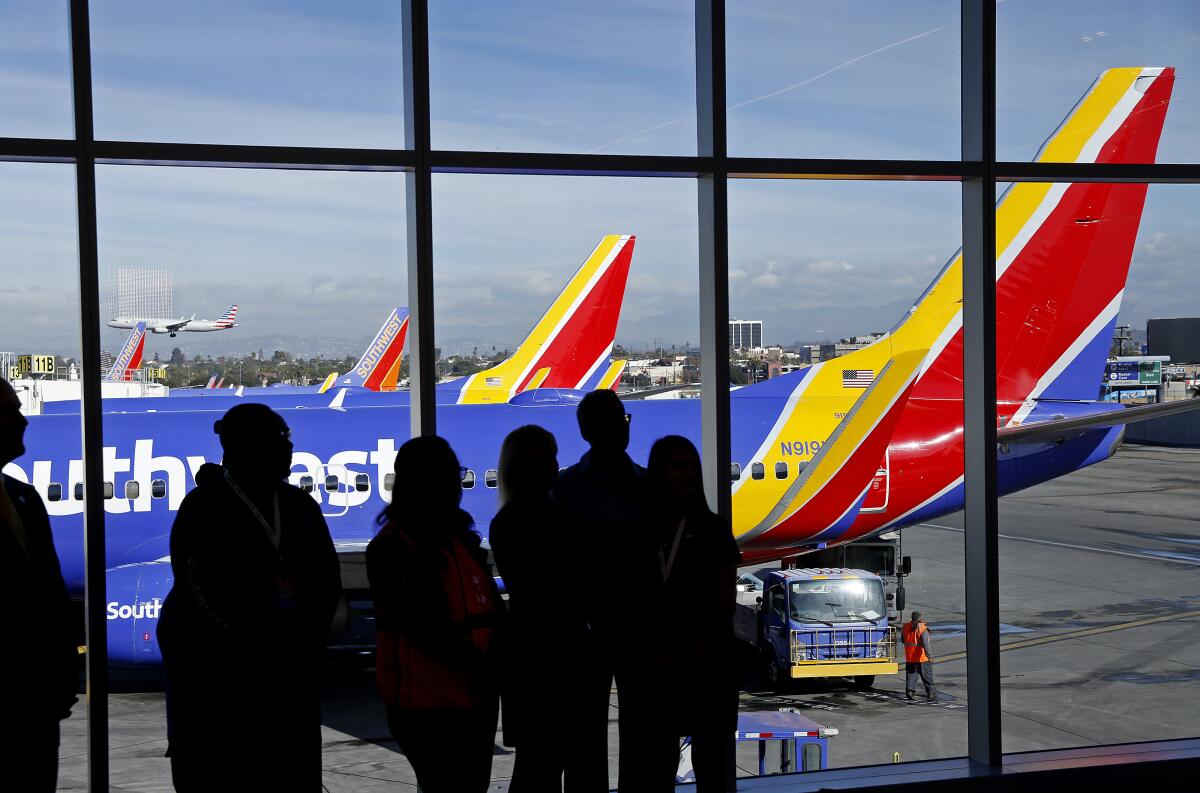Thanksgiving travel is coming back. Are airlines ready?

- Share via
Air traffic for the Thanksgiving holiday is expected to approach pre-pandemic levels, and travelers may be considering their plans with some dread, given fresh memories about thousands of canceled flights.
Roughly 2 million people a day are projected to fly Nov. 19-28, according to the Transportation Security Administration, with the potential for some days to exceed that average dramatically. Passenger traffic for the last five days of that period would be just 9% below 2019, before the pandemic hit, according to AAA.
A $100,000 signing bonus for a veterinarian? COVID has changed American work life, with employees asking for more, and employers obliging.
United Airlines Holdings Inc. expects to fly more than 4.5 million passengers, about 88% of its 2019 level, Nov. 19-30. Delta Air Lines Inc. anticipates flying around the same level, carrying at least 5.6 million customers.
American and Southwest Airlines Co. didn’t provide similar projections, but they’re the airlines that consumers might be most concerned about, after the carriers were wracked by cancellations last month. Storms combined with staffing shortages after the carriers resumed service too enthusiastically from pandemic lows, leading to thousands of flights being scrubbed.
Both companies have since reduced flying, brought workers back from leave, hired new ones and offered incentives in the hopes that employees won’t miss work over the holidays.
United Chief Executive Scott Kirby said on Bloomberg Television that he’s “confident” the carrier is fully staffed for the holiday crunch and won’t experience operational problems.
Unions also say they’re prepared, assuming meteorological forces cooperate. “It’s really important for people to remember what they knew about airline travel two years ago,” said Sara Nelson, president of the 50,000-member Assn. of Flight Attendants-CWA. “If there’s weather, we’re going to see delays.”
Would-be travelers seem optimistic. Tickets sold in the U.S. for domestic and international trips during the 14-day Thanksgiving travel period were 11% below where they were in 2019, according to Nov. 14 data from the Airlines for America lobbying group.
“People aren’t going to be deterred by the possibilities of storms and delays,” said Christie Hudson, a spokesperson for travel services provider Expedia Group Inc. “The pent-up demand is a huge factor, especially if you didn’t get to see your grandparents or family members last year or had to cancel trips earlier this year. Our mentality now is, ‘Screw it, I’m going.’”
Weather and typical holiday travel snags aside, there are reasons to be particularly wary this year.
The nationwide labor shortage and tight staffing that has lingered from the depths of the pandemic have left many airport employees and flight crews stressed from working heavy overtime. Airline workers also have had to contend with a spate of belligerent passengers amid the pandemic.
Also, the busy run-up to the holiday coincides with a Nov. 22 deadline for federal workers, which includes airport security screeners, to get COVID-19 vaccinations. Many Transportation Security Administration officers haven’t gotten the shots, said Hydrick Thomas, president of the American Federation of Government Employees union division that represents frontline TSA workers.
The agency, which has just completed a hiring surge, and the union said they don’t anticipate disruptions. Federal guidelines allow for gradual measures to ensure vaccination compliance so there won’t be mass firings during Thanksgiving week or immediately after, the TSA said.
Even if there are longer security lines and flight delays, some travelers won’t be fazed because they can build in extra travel time, taking advantage of the pandemic’s shift toward more workplace flexibility.
That allows people to take longer breaks from the office to avoid peak travel days, said Mike Daher, a transportation and hospitality consultant for Deloitte. About 75% of travelers plan to add at least one day to their holiday trip because they can work on the road, according to a recent Deloitte study.
Bloomberg staff writer Justin Bachman contributed to this report.
More to Read
Inside the business of entertainment
The Wide Shot brings you news, analysis and insights on everything from streaming wars to production — and what it all means for the future.
You may occasionally receive promotional content from the Los Angeles Times.











